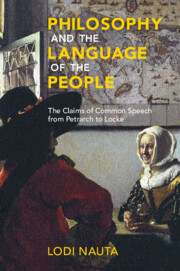Book contents
- Philosophy and the Language of the People
- Philosophy and the Language of the People
- Copyright page
- Contents
- Acknowledgments
- Introduction
- Chapter 1 Early Humanist Critics of Scholastic Language: Francesco Petrarch and Leonardo Bruni
- Chapter 2 From a Linguistic Point of View: Lorenzo Valla’s Critique of Aristotelian-Scholastic Philosophy
- Chapter 3 Giovanni Pontano on Language, Meaning, and Grammar
- Chapter 4 Juan Luis Vives on Language, Knowledge, and the Topics
- Chapter 5 Anti-Essentialism and the Rhetoricization of Knowledge: Mario Nizolio’s Humanist Attack on Universals
- Chapter 6 Skepticism and the Critique of Language in Francisco Sanches
- Chapter 7 Thomas Hobbes and the Rhetoric of Common Language
- Chapter 8 Between Private Signification and Common Use: Locke on Ideas, Words, and the Social Dimension of Language
- Conclusion
- Bibliography
- Index
Chapter 1 - Early Humanist Critics of Scholastic Language: Francesco Petrarch and Leonardo Bruni
Published online by Cambridge University Press: 13 July 2021
- Philosophy and the Language of the People
- Philosophy and the Language of the People
- Copyright page
- Contents
- Acknowledgments
- Introduction
- Chapter 1 Early Humanist Critics of Scholastic Language: Francesco Petrarch and Leonardo Bruni
- Chapter 2 From a Linguistic Point of View: Lorenzo Valla’s Critique of Aristotelian-Scholastic Philosophy
- Chapter 3 Giovanni Pontano on Language, Meaning, and Grammar
- Chapter 4 Juan Luis Vives on Language, Knowledge, and the Topics
- Chapter 5 Anti-Essentialism and the Rhetoricization of Knowledge: Mario Nizolio’s Humanist Attack on Universals
- Chapter 6 Skepticism and the Critique of Language in Francisco Sanches
- Chapter 7 Thomas Hobbes and the Rhetoric of Common Language
- Chapter 8 Between Private Signification and Common Use: Locke on Ideas, Words, and the Social Dimension of Language
- Conclusion
- Bibliography
- Index
Summary
In this chapter two early critics of scholastic language are discussed: Petrarch and Leonardo Bruni. For Petrarch the revival of ancient Latin was an essential part of the moral, religious, and cultural reform of the late-medieval society in which he lived. As this chapter makes clear, this fundamentally humanist conviction also led to some tensions in Petrarch’s vision: Christian faith was difficult to combine with the pagan thought of Cicero, and even though Petrarch greatly admired the latter’s style, it was not always compatible with Petrarch’s own need for inner dialogue and meditation. Petrach’s rejection of scholastic language was further developed by Bruni in his criticisms of the medieval translation of Aristotle’s Ethics, and Bruni later developed his view in his treatise on the art of translation. The chapter analyzes the debate between Bruni and his critics, showing that both sides made valuable points about the use and abuse of philosophical language. As the debate makes clear, words such as “precise,” “exact,” and “faithful” as applied to translations are normative rather than descriptive terms, and there is no straightforward yardstick of fidelity. What is at stake is a discussion about the trade-off between popular accessibility and philosophical precision.
- Type
- Chapter
- Information
- Philosophy and the Language of the PeopleThe Claims of Common Speech from Petrarch to Locke, pp. 20 - 43Publisher: Cambridge University PressPrint publication year: 2021

